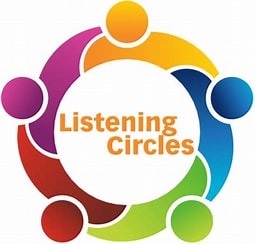YOUR CART

Listening Circles: trend or ancient wisdom?
Bill Bickle
- ,
- , Faith
Guest Co-Author: Anne Martin, PhD, Director of FaithCare

Many processes introduced into the Church take on a life of their own, pass through a fad stage, and then peter out. Listening Circles are not a trend, because they are principle-based, they introduce deeply needed skills and practices into the congregational culture when the capacity for listening to understand – concepts, or one another – may be at an all time low. And they plum the very depths of what it means to be human: we are made to be relational, to be in relationship. We are made in God’s image and we can see this relationality in the Trinity as each of the three persons relates to one another – eternally. We are drawn into this relationship, or relationships, through the coming of Jesus to be with us. This very ‘with-ness’ is a core principle of Restorative Practice, and therefore at the heart of Listening Circles.

So, what is a Listening Circle, and how does it work? Listening Circles are designed to hear one another out – on an issue, or just to understand one another better. When circle participants engage with one another to listen, they do not respond, they do not argue, they just listen. It is not the same as a conversation: it is just hearing one another, to understand. Imagine the last time you were listened to well, what happened? You likely felt heard, that is, acknowledged. Maybe you felt understood, that the person cared and was trying to get inside your thinking, your feeling. An empathy. Perhaps it was mutual, and so relationship was reciprocated, deepened.

So a Listening Circle can be used to discern something, a calling, the heart or/& mind of the community on an issue, or a concern, or a decision to be made. It may be about hearing one another out just to hear one another out, not to make a decision, not to argue, not to reach a conclusion. They may be used to inform a future conversation, frame the conversation’s key elements, discern God’s direction, name potential risks, or determine what questions need to be plumbed or answered. Sometimes they will be about unity: how the community or group stays together through a time of conflict or unrest.

Like all restorative circles, they are invitational, one is never dragged into a conversation. So participants are expected to bring a posture of care and grace as they listen to one another. Then the group can reflect on what it has heard, how to use the information that has been gathered, how it fits with the original intent of the gathering.
If you want to know more about Listening Circles and how they might appropriate in your church’s context, give us a call. Please see FaithCare’s website for information about Restorative Practice with churches in Canada, and beyond.
† † †
FaithCare, a division of Shalem Mental Health Network, helps churches work through conflicts in such a way that they lead to deeper understanding and healthier relationships. And through training and mentoring, FaithCARE gives tools to help churches become restorative congregations—to build strong, healthy, “conflict-friendly” communities.
FaithCare: FaithCARE – Shalem Mental Health Network (shalemnetwork.org)
Shalem: Home – Shalem Mental Health Network (shalemnetwork.org)

